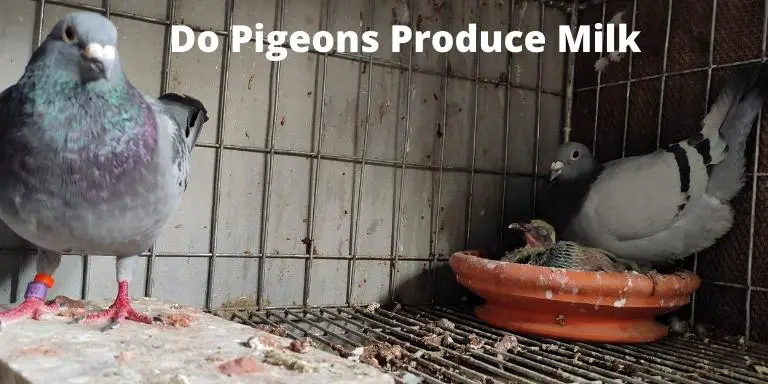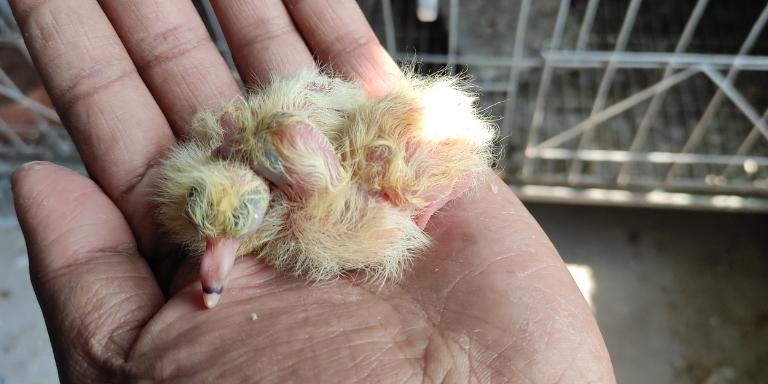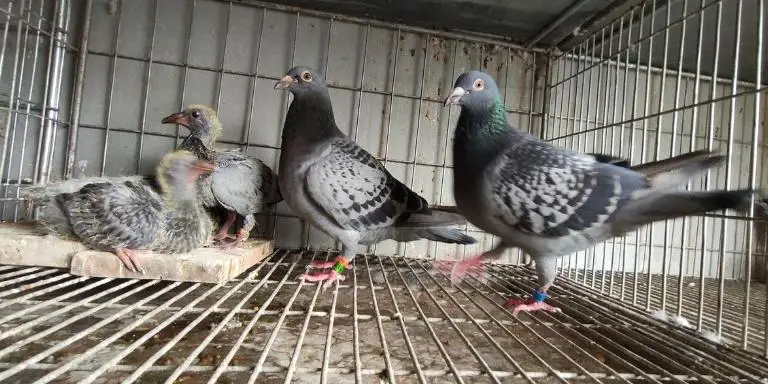Doesn’t it sound fascinating to hear about pigeons producing milk, right? Scientists found that the trait of producing milk is not only limited to mammals anymore. Instead, birds like pigeons have their way of producing it for their baby squabs.
Pigeon milk is commonly known as ‘Crop Milk’. Unlike mammalian milk, it’s a curd or cottage cheese-like substance that pigeons produce in their entrails. However, it follows similar nutritional ingredients as mammal milk.
Let’s get to know more about it.

Do Pigeons Produce Milk?
We know it must’ve sounded quite mysterious to you if pigeons secrete milk or something?
Surprisingly, pigeons secrete milk, but not the type of mammalian milk you are thinking of.
The pigeon, along with male emperor penguins and flamingos, is the three bird species known for secreting ‘Crop Milk’ to feed their babies.
During lactation, pigeons produce a substance that feels like cottage cheese or curd. This element is generated from the cell filled with fat. Then pigeons regurgitate it and feed the baby squabs.
This final substance is what you know as ‘Crop Milk’. But this crop milk is fed only to baby pigeons. Once they are weaned, the crop milk stops being generated automatically.
What is Pigeon Crop Milk?
Crop milk is a semi-solid element with high fat and protein levels. You can think of it as yellow cottage cheese. It’s highly nutritious because of its immunity-enhancing factors, antibodies, and antioxidants.
Similarly, pigeon crop milk contains more protein and fat-rich substances than human milk.
Usually, it is produced a few days before the eggs are about to hatch. The squabs (baby pigeons) live on the crop milk for about 7-10 days.
Statistically, squabs that feed pigeon crop milk were 16% heavier and healthier after the end of the research experiment.
Research shows even though both parent pigeons produce pigeon milk, it’s not enough to feed three squabs sufficiently. That’s why clutches are usually confined to two.
Is Pigeon Milk Really Milk?
Well, pigeon milk is not similar to milk substances like mammals (i.e., humans). Instead, it’s more like crumbly excretion that contains intense protein and fat. It is produced from the fluid cells of pigeons.
You can consider the crop milk coming from a sleazy sac-like pocket that works as food storage that projects outwards underneath the gullet.
However, the term ‘Pigeon Milk’ is globally accepted even though the term is a bit misleading and unusual.
Because it may sound like Pigeons are producing milk similar to mammals’ milk, pigeon birds offer a particular type of milk to their baby squabs. But neither of these is correct.
Instead, this pigeon crop milk is occupied with protein and fat that pigeons produce from their own cells. But both pigeons and mammals indeed have prolactin hormones that cause lactation in birds.
Crop Milk Nutrition Composition
According to the research published in ‘Elsevier’, crop milk is highly nutritious similar to mammal milk. The substance consists of immunity-enhancing protein (50 to 60%), fat (30 to 36%), antioxidants, minerals (Sodium, Calcium, Potassium, etc.), antibodies, carbohydrates( 1 to 3%), and so on.
According to another research, baby birds that are fed crop milk are 16% heavier than other birds. However, the density of nutrition varies from bird species to species.
So, the composition of nutrition ingredients might change according to it. Nevertheless, this semi-liquid crop milk contains high-level nutrition for the growth and development of baby birds.
Do Pigeons Have Nipples?
Indeed, it will be unusual to see pigeons having nipples, right? And yes, pigeons do not have nipples. But you might wonder, if pigeons produce milk, then why don’t they have nipples? Well, let us explain it.
Usually, mammals contain nipples as they have breasts to provide milk to their child. But these breasts consist of mammary glands that mammals use to feed milk to their child.
However, you can say pigeons or birds, in general, do have breasts. But not for feeding milk to the squabs; rather, use it for flight purposes. How so? Because the breast consists of pectoral muscles that help birds to fly.
So, pigeons do not feed the crop milk their squabs from the breast or nipple. Instead, they provide the secretion from a muscular pouch inside the digestive part of the body.
How do pigeons feed their babies?

Squabs or baby pigeons are fed in some exciting ways. We are already enchanted by knowing that pigeons produce crop milk and feed it to their babies. However, there’s always a timing of feeding crop milk to the squabs.
For the first four days, both pigeon parents feed regurgitated crop milk to the babies. This starts within 2 hours of hatching and lasts approximately 7 to 10 days. After the first four days, they feed crop milk, seeds, and other food.
Usually, baby pigeons start their adult diet from the 10th day. This is when they begin consuming invertebrates, fruits, seeds, etc. Nevertheless, baby pigeons do a peeping call to be fed by their parents.
During the initial days, they require food 3 to 4 times. It goes for around the 7th day. Whereas they usually ask for food two times a day after that.
Is Crop Milk Necessary For Baby Pigeon?
Undoubtedly, crop milk is highly essential for baby squabs. Let’s break down the wide range of nutrition that crop milk provides.

Fat & Protein intensity
First, it consists of highly-dense fat and protein. This protein is a crucial factor in the immunity-boosting of baby pigeons. Secondly, fat is indispensable for the overall health, growth, and development of baby birds.
Bacteria availability for digestion
On the other hand, the crop milk consists of some bacteria as well. So, by consuming this, baby pigeons grow a healthy and strong digestive system.
Immunity booster
Additionally, as both parent pigeons can provide the necessary crop milk, baby pigeons constantly get antibodies, minerals, and antioxidants from this nutritious liquid along with seeds, insects, and other food.
That’s why they can have a consistent food discipline to improve their health and body.
Can You Drink Pigeon Milk?
You might find it quite fascinating to drink pigeon milk, right? Even though scientists have shown a possibility of drinking pigeon milk in the near future, for now, technically, you can not drink pigeon milk. Let me tell you in detail.
Look, there’s a huge difference in the substance of mammals’ milk and pigeons’ crop milk. You can think of crop milk coming from a little pouch located somewhere in the stomach or throat of the pigeon.
There is no natural way to squeeze out that milk from pigeons. Even if you can, all you’ll get is a nurturing substance full of fat, antioxidants, and immune-enhancing protein.
But the element is not drinkable based on the way it is produced. Once you taste it, you’ll simply spit it out. Additionally, it won’t be healthy for your body either.
Can I Buy Pigeon Milk?
Nowadays, you can easily avail of this crop milk dietary supplement from various marketplaces. For instance, you can get Rohn Fried Crop Milk (600g) from the Amazon site.
This crop milk is a powder form version for efficient storage purposes. However, you can optimize and generate outstanding breeding results by using it.
This ingredient consists of high-level animal protein components and an amino acid mixture.
Nevertheless, there are some other verified websites from where you can get crop milk for baby squabs. Other than this, you can also avail of it from various pet stores.
Which Bird Gives Milk To Their Babies?
Birds giving milk to their babies is considered a common myth. Why is that? Well, birds produce a different substance that is not similar to mammals’ milk.
Out of all types of birds, only three species can produce this type of milk. These are- pigeons, flamingos, and penguins.
These birds produce a milk-like essence to feed their babies during the initial stage of hatching. So, these birds’ crop milk is utterly different from mammal milk.
Conclusion
Pigeons produce the crop milk in an exclusive way out of their entrails. Unlike mammals, they even feed their baby squabs differently. However, crop milk’s nutrients are similar to mammal milk. We hope you find this article helpful. Good luck.
You might also be interested in:
- Can Pigeons Swim? A Brief Water Guide
- Why Do People Keep Pigeons | Top 8 Reasons
- Do Pigeons Leave Their Babies [It’s Not What you Think]
- How Many Pigeons in NYC | Let’s Find Out
- How Much Can a Pigeon Carry? Surprising Facts!
- Pigeon Appreciation Day | A Tribute to The Peace Messenger
- Wood pigeons vs Feral pigeon | A In-Depth Comparison
Thank you so much for this added tidbit of information. It’s always a pleasure to learn about other creatures who share the earth with us!!